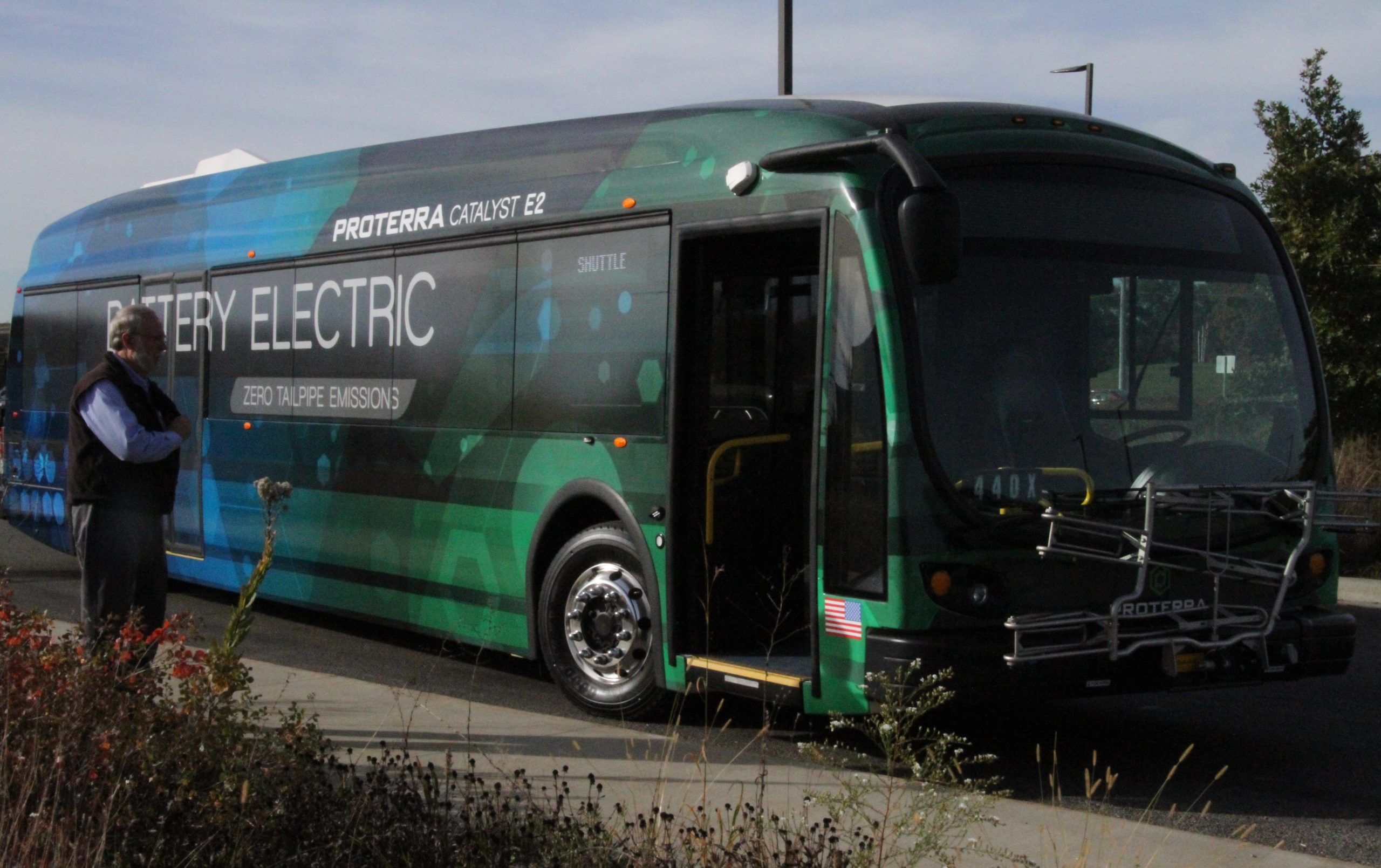
By the end of the month, the Capital Metropolitan Transportation Authority will have received all 12 battery-electric buses that make up its initial investment in what will become a zero-emission public transportation fleet. With two of those already in service and eight others now being tested at the North Ops bus yard, Chief Operating Officer Dottie Watkins said the agency’s transition away from diesel is going better than expected.
Since January, Capital Metro has been running its first two 40-foot electric Proterra buses on a limited basis along routes that depart from the North Ops facility. After a combined 6,700 miles in service so far, the buses are showing projected ranges of 191-196 miles on a full charge compared to the expected maximum range of about 150 miles. While the batteries are likely to degrade over time, Watkins said the buses are performing “a good bit better than we thought.”
The emission-free buses have also saved an estimated 17.5 tons of CO2 and about 40 pounds of N2O from the atmosphere, equal to the carbon-capturing capacity of 30 acres of U.S. forests over a year, per the Environmental Protection Agency’s metrics.
“This looks phenomenal, both in terms of what it’s doing for the environment and in terms for the overall use,” Williamson County representative Eric Stratton said at Monday’s board meeting. “I couldn’t be more excited about … what we’re seeing here just early on with these results.”
Transportation accounts for 36 percent of greenhouse gas emissions in the city of Austin, according to the city’s estimate. The Office of Sustainability has predicted that greenhouse gas emissions could accelerate climate change by the end of the century to the point that over 63 days a year have high temperatures above 100 degrees Fahrenheit, a sharp contrast to the historic local average of about 12 100-degree days a year.
New Flyer – from whom Capital Metro has purchased six electric buses – claims each of its 40-foot vehicles can save up to 100 tons of greenhouse gas emissions a year by replacing diesel buses. By a conservative estimate, Watkins told the Austin Monitor that a full year with the 12 electric buses in service could cut the transit system’s emissions by 210 tons of CO2 and 479 pounds of N2O, equal to the annual carbon-consuming power of 333 acres of forest.
Until now, Capital Metro has been running the two Proterra buses an average of 62-74 miles at a time to test their performance. In the next few weeks, Watkins has requested the electric buses be run for as many miles as possible to see how they fare in the peak summer heat with more of the battery power being used to keep the buses cool inside.
“They have so far been performing well,” Watkins said. “They’re able to cool well, so I think what we’ll be really watching is how that results in degradation of the range abilities. We are having to use electricity to run the air-conditioning systems so we’ll be watching that closely.”
Over the next month, Capital Metro plans to cycle the e-buses through the two temporary charging stations installed at North Ops for the first Proterra buses in order to keep all vehicles charged. By the end of September, the North Ops parking facility will have permanent charging stations ready for all 12 buses. A mobile charging trailer will soon be delivered so that any stranded buses can be recharged and brought back to the bus yard.
Capital Metro is awaiting two 40-foot Proterra buses in the coming week, the last of the initial investment. Last week, the agency received its second 60-foot battery-electric bus by New Flyer, which CEO Randy Clarke called “the bus of the future.”
“It’s the first one in Texas,” Clarke said. “Probably seven or eight other places in North America have got a 60-foot bus. It’s probably the nicest bus ever actually manufactured by New Flyer. It has a lot of features.”
The first 60-foot New Flyer bus was delivered earlier this month and is getting ready to hit the road this week. In May, Capital Metro received its second low- or no-emission bus grant of $2.26 million from the Federal Transit Administration, which will be used to help purchase four more 60-foot New Flyer buses, slated for delivery in Fiscal Year 2022.
Watkins said the agency will soon prepare a new request for proposal to continue its fleet replacement process and purchase new electric buses for expanded service in Project Connect. The agency plans to buy 19 40-foot electric buses for fleet replacement in Fiscal Year 2022.
Photo by Jonathunder/GFDL 1.2.
The Austin Monitor’s work is made possible by donations from the community. Though our reporting covers donors from time to time, we are careful to keep business and editorial efforts separate while maintaining transparency. A complete list of donors is available here, and our code of ethics is explained here.
"electric" - Google News
August 25, 2020 at 12:05PM
https://ift.tt/34xulPo
Capital Metro electric buses running longer than predicted, cutting emissions - Austin Monitor
"electric" - Google News
https://ift.tt/2yk35WT
https://ift.tt/2YsSbsy
Bagikan Berita Ini














0 Response to "Capital Metro electric buses running longer than predicted, cutting emissions - Austin Monitor"
Post a Comment